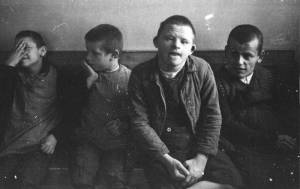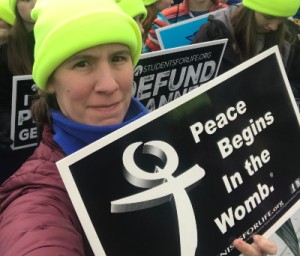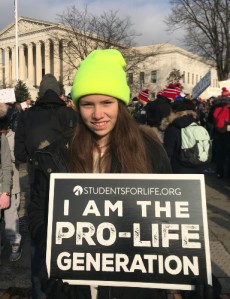
The death of innocence and the death of innocents
Last January, a friend and I chaperoned twelve teenage girls to Washington, DC, to attend the national March for Life. (No one was lost, so tomorrow we attempt to repeat the feat for the 2020 March.)
Our first stop, fresh off the airplane, was at the United States Holocaust Memorial Museum. No choice, really: it was one of the only museums still open during the 2019 federal government shutdown. But the girls’ history classes were about to begin a unit on World War II, so the timing was fortuitous.
And most importantly of all, we were there to march against a holocaust of a new kind, of an incomprehensible scale.
The entire top floor of the museum is dedicated to the events that preceded the war: Hitler’s appointment as Chancellor and his takeover of the government; the insidious, steady erosion of the rights of Jews; the cowardly response of international leaders in the face of the Nazi regime’s naked aggression.
The girls wandered independently. I caught up to my own daughter, Theda, in front of an exhibit marked:
NAZI PERSECUTION OF THE DISABLED: MURDER OF THE “UNFIT.”
A bare metal bed frame lay behind the glass. The surrounding walls showed pictures of physically and mentally disabled German children, being evaluated by teams of “experts,” who took them away to be murdered while providing false explanations to their parents.

Image: Black and white photo of four boys sitting on a bench. One covers his face, one looks off to the side, two look directly into the camera.
You can see many more materials at the US Holocaust Memorial Museum’s online exhibit, or read more about the Aktion T4 program that targeted the disabled.
After a long, silent moment, taking in the words and images, Theda turned to me and asked, “Would Oscar have been killed?”
She is a smart girl. She must have already known the answer to this question, known that yes, our child — her non-verbal, non-ambulatory, epileptic little brother — would have been first on the truck.
I think she was just hoping I could give her a different answer, a kinder one.
I breathed out, something between a sigh and a moan, knowing that the words about to leave my mouth signaled the ultimate end of her childhood, a precipice that had already been looming ahead of us for a long while.
“Yes, honey,” I met her eyes. “Yes, he would have been.”
She turned back to the window, nodded, and moved on to the next.
***
Iceland has nearly “eradicated Down Syndrome” through selective abortion of fetuses diagnosed with that genetic disorder in utero. What this means, in actuality, is that Iceland has nearly eradicated people with Down Syndrome. In the United States, direct statistics are harder to come by, but estimates suggest about 65-85% of DS babies diagnosed prenatally are aborted, and that the US Down Syndrome population has been reduced by one-third compared to what it would have been otherwise.
Opponents of Texas’ HB2 — passed in 2013 and later overturned by the Supreme Court (remember Wendy Davis? That HB2) — were especially vocal in their opposition to the provision that banned abortion after 20 weeks of gestation. They argued that many families only learn of fetal abnormalities at the 20-week ultrasound.
The ban on late-term abortions meant that those disabilities might not be diagnosed in time to allow those disabled children to be killed before they became burdens to their parents and society.
Does that way of thinking remind you of anything?
I am not being glib. I am not being alarmist. This is a moral outrage that points back to the dark heart of eugenics: a baby who is wanted and eagerly anticipated, by parents who are ready to raise her or him… until it becomes clear that the genetic cards are stacked against this baby. That she will not be perfect.
If you needed further proof, look at the states of New York and Illinois: sweeping abortion reforms in 2019 now allow doctors to actively kill babies up to the very moment of delivery, and allow doctors to let babies who survive an abortion die after birth, unattended.

Image: Women taking a selfie, wearing a purple winter coat and neon yellow hat. She holds a sign that reads, “Peace Begins in the Womb.”
Don’t kid yourself. Under no circumstances is waiting 24 to 48 hours to induce a medically complicated labor and delivery and murder an unborn child in the third trimester (even one with a life-limiting disability) the best way to “save a mother’s life.”
***
There’s an apocryphal story about a church that turned away a child with special needs from a Sunday school program. The nun explained, “We don’t have the resources or experience to provide what he needs.”
The mother responded, “With all due respect, Sister, neither do we.”
A dear friend gently suggested that I need to name my privilege here, and I do that willingly. We have a lot of resources that others don’t, and those resources — financial, familial, communal — make it possible for us to “do it,” even as people regularly remark they don’t know how we do it.
And I argue, in addition, that privilege clouds the point. Disability and disease are part of the human condition. Raising children with disabilities and disease should not be thought of as extraordinary, something to be done only by extraordinary people (or people of extraordinary means). It is precisely the tacit mindset that disabled unborn children should be “taken care of” that leads to the spoken mindset that caring for disabled born children is something only privileged people can or should do.

Image: Woman with dark hair smiling, surrounded by crowd. She holds a blue sign that reads, “To tell the truth about what it means to be human.”
Writing in America magazine, Jeremy McLellan rightly noted, “[W]e are all burdens. We were once burdens, and we will be burdens again.”
The Christian life, in many ways, is about how we respond to those who are burdensome. Do we welcome them with syringes and cannulae and boxcars and border fences, or do we embrace the challenge of loving them deeply — even with great difficulty — and walk a step forward on the path to sainthood?
I’m not making a political argument here. Both sides get it wrong, a lot. There is no political party with the moral high ground when it comes to valuing and respecting all life, everywhere, at every stage.
This is not a religious argument, either. Although those who serve immigrants at the border are often secular and those who serve women during and after crisis pregnancies tend to be religious, there are also groups and individuals that defy those stereotypes.
There’s no denying the fact that valuing and respecting all life is never the easy or politically expedient thing to do. In fact, it’s usually the most difficult. It requires tremendous sacrifice on the part of the caregiver, and tremendous support of that sacrifice on the part of the wider community.
If, however, we cannot welcome our own children into our lives — even the children whose lives we know will be especially complicated — what hope do we have of welcoming anyone else into our homes and communities, or Christ into our hearts?

Image: Teenage girl in a neon yellow hat standing in front of the US Supreme Court, surrounded by a crowd. She holds a sign that reads, “I am the pro-life generation.”

Standing ovation! What an absolutely marvelous piece. You weave together so many facets of this issue with great understanding, showing how your personal experience highlights a larger cultural poverty. Well done!!
I very much look forward to all your posts, but this one hit it out of the park. Thank you for sharing your talents!!!
Thank you for the kind words! The juxtaposition of the Holocaust Museum and the March was a very powerful moment for me (and for those teenage girls too).
Thank you for reading and commenting!
Thank you for marching for those who have no voice. Prayers for a safe trip that is as meaningful as last year!
Thank you, my friend.
You write with incredible clarity and compassion. Thank you for such a phenomenal article!!
Thank you so much, Emily.
Christy, I realize I’m not your intended audience for this post, and I guess I should have realized that eventually you might post something here I couldn’t possibly disagree with more. I don’t want to get into the ideological differences between us, because there’s no point to that discussion.
I just want to note that I do not appreciate your equating abortion to the Holocaust. There is no logical connection between the two. Attempts to create one can only degrade and cheapen the memory of the many millions of people who were systematically murdered by an evil regime and those who aided and abetted it.
I’ve actually been waiting for a comment from someone who disagrees, and I thank you for being honest enough to speak out. I don’t write just to hear from the echo chamber, and I welcome frank discussion. And thanks, too, for being so respectful, even though I can tell this is emotionally charged for you.
I understand that the Holocaust has very real, personal, and community connections for you that it doesn’t have for me. And I hope you know me (even virtually) well enough to know that my intent would never be to degrade or cheapen anyone’s memory. I want to start by making clear that I believe unborn children are embodied human souls, entitled to the full dignity and rights of any human; I’m sure that’s one of our major points of (intractable) disagreement.
Given that that’s my starting point, I hope the reason I made the connection between the Holocaust and abortion is clearer, and that I didn’t make it sloppily or cavalierly. I have a profound and grave respect for what many communities, including the disabled but most especially and particularly the Jews, were put through under that evil regime. The argument I’m trying to make is that the same systematic dehumanization is at work in both situations, and in many others. Whenever human life — at any stage — is viewed as “other” or “less than,” one group of people suffers aggressive violence at the hands of another. Many millions of people are still being systematically murdered through abortion, many of them precisely because and only because they are disabled.
I appreciate the work of groups like Rehumanize International, which points out the ways different groups of humans in history and still today have been (are being) dehumanized using the same ol’, same ol’ kinds of words and thinking.
https://www.rehumanizeintl.org/badwords
Is abortion an enforced practice? Are people literally being forced to have abortions in the United States? This is not the situation today. It has never been the situation. If the government were the one enforcing abortions and legislating when it happens, that might take us closer to the precedent set by the Nazis. I abhor our current administration but I have never agreed with people who are quick to make the comparison to Hitler’s regime. We can say that child migrant detention and family separation is inhumane without recourse to terminology from history. So I know you can make whatever point it is you want to about abortion without falling back on the Holocaust as the way to make yourself heard by those willing to accept it.
While stopping abortion is an urgent issue for you, the need for people to be able to make the choice to terminate a pregnancy, for ANY reason they may need to without government interference and in a medically safe way (and there are myriad good reasons someone might need to) is just as urgent to me. I do not share your opinion about when human life begins. I say that with utmost respect for the lengths to which you have had to go to keep your child safe and to ensure that he thrives. As you mentioned, not everyone has the means to do that, and as such I am grateful that they can make the choice they may want and need to — not to proceed with bringing life into this world which will be difficult or impossible to sustain.
I disagree that we can’t appeal to the terminology of history, even history as unique and terrible as the Holocaust, to understand the present. And I repeat: I fully agree with you that to invoke the Holocaust lightly is disrespectful and callous.
You’re right that I hadn’t addressed the aspect of state sponsorship/force, and I appreciate you pointing out it that difference. But to the disabled person threatened with death (on either side of the womb), the question of whether eugenics is carried out solely by a totalitarian regime or by a democratic medical-industrial-societal complex is immaterial.
One thing to acknowledge here is that our worldviews are both internally consistent, logically speaking. Just as you are compelled to speak out for the things you name, given the fundamental assumptions at their base, so am I, given mine. I see and respect — and in fact used to claim as my own — the architecture of your argument. But there is truly no way to reconcile the two sets of beliefs (and I use the word beliefs rather than opinions intentionally, because my worldview also assumes that beliefs are attempts to correspond to a Truth, not just our subjective emotions and thoughts about a matter).
It also needs to be said that our worldviews have as a shared and fundamental value the desire to care well for people. Mothers and babies both. I know that you are speaking from a place of love and concern; I am too.
But beyond that, I feel like we’ve reached a point of diminishing returns, at least in this medium, and no minds will be changed here. I’m sorry that my post upset you, because I consider you a friend and I care about your feelings, and I wish you peace.